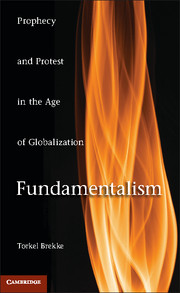Book contents
- Frontmatter
- Contents
- Acknowledgments
- Introduction
- Part I The Historical and Ideological Context of Fundamentalism
- 1 Religion and Modernity in the West
- 2 Religion and Globalization
- 3 A Global Shift in Religious Authority
- 4 Prophecy and Preaching
- Part II Fundamentalist Struggles
- Bibliography
- Index
- References
3 - A Global Shift in Religious Authority
from Part I - The Historical and Ideological Context of Fundamentalism
Published online by Cambridge University Press: 05 June 2012
- Frontmatter
- Contents
- Acknowledgments
- Introduction
- Part I The Historical and Ideological Context of Fundamentalism
- 1 Religion and Modernity in the West
- 2 Religion and Globalization
- 3 A Global Shift in Religious Authority
- 4 Prophecy and Preaching
- Part II Fundamentalist Struggles
- Bibliography
- Index
- References
Summary
In the last two chapters, I claimed that fundamentalism in the world religions presupposes a process of intense modernization and globalization that has taken place over the past two centuries, and especially since the second half of the nineteenth century. In particular, there took place a process of secularization in the limited sense of differentiation of religions from other systems, such as politics, law, and education. There is no reason to assume that the period of modernization and globalization we are looking at produced secularization in the sense of decline in religious belief, but there is no doubt that differentiation has taken place globally, although with significant local variations. Closely linked to the process of differentiation, there took place a process of objectification through which religion came to be seen as a thing that could be detached from culture. This resulted in a new and self-conscious way of relating to religion.
In the same period, Christianity became a powerful model for the reconfiguration of Islam, Hinduism, Buddhism, and Sikhism as world religions. New religious styles, forms of religious leadership, and types of religious organizations were developed with Christianity as the model. People all over the world came to see themselves as members of religions, just as they belonged to different states. There developed a global system of religions in which the different world religions were defined, both by believers and external observers, in relation to each other. It was obvious to everybody that, say, Islam and Hinduism had somewhat different contents, but at the same time they were thought to be, and made to be, structurally similar.
- Type
- Chapter
- Information
- FundamentalismProphecy and Protest in an Age of Globalization, pp. 64 - 87Publisher: Cambridge University PressPrint publication year: 2011



